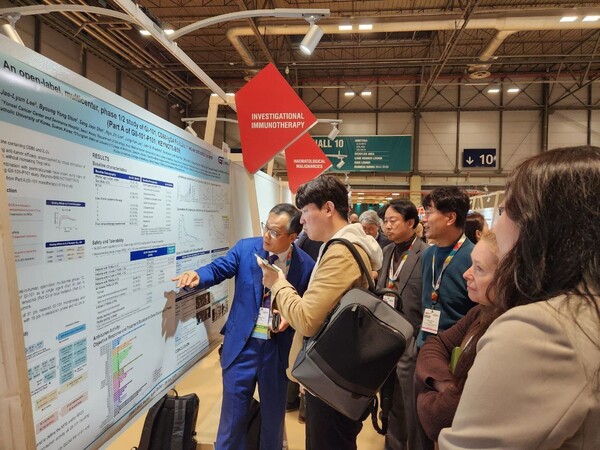GI Innovation said it would begin patient enrollment for its phase 1/2a clinical trial of GI-108, a fourth-generation metabolic immunotherapy.

GI Innovation has commenced patient enrollment for the phase 1/2a trial of its fourth-generation metabolic immunotherapy GI-108, a novel dual fusion antibody protein targeting cancer cell metabolism. The picture shows Professor Cho Byoung-chul explaining the preclinical trial results of GI-108 during ESMO 2023, held in Madrid, Spain. (Credit: GI Innovation)
The company is collaborating with contract development and research organization (CDRO) MediRama to accelerate the clinical development of its pipeline, following the progress of its other immunotherapy candidates GI-101A and GI-102.
The company expects that GI-108 will become a first-in-class dual fusion antibody protein treatment that overcomes the limitations of conventional CD73-targeting antibodies currently under development by global pharmaceutical firms.
The novel candidate inhibits cancer cell metabolism by integrating a CD73 antibody with an IL-2 variant, thereby enhancing anti-cancer efficacy.
In preclinical studies, GI-108 demonstrated significant anti-tumor activity across various cold tumor models. Notably, the company stressed that in a human triple-negative breast cancer (TNBC) model, GI-108 monotherapy exhibited superior anti-cancer effects compared to MSD’s Keytruda.
Also, in a multiple myeloma model, GI-108 achieved a 100 percent complete remission rate in the early-stage combination therapy with CAR-T cell therapy, resulting in total tumor eradication.
Leveraging this robust preclinical data, the ongoing clinical trial will focus on patients with non-small cell lung cancer (NSCLC), pancreatic cancer, and renal cancer. The trial will be conducted at three medical institutions in Korea -- Severance Hospital, Samsung Medical Center, and Asan Medical Center. The principal investigator of the study is Professor Cho Byoung Chul of the Department of Medical Oncology at Severance Hospital.
“Immunotherapy drug-resistant NSCLC remains a highly challenging field where even global pharmaceutical ADC therapies have failed,” Cho said. “GI-108 effectively suppresses tumor metabolism while enhancing the cytotoxicity of tumor-infiltrating T cells, providing a competitive edge over existing global therapies.”